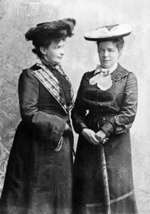Sophie Elkan

Sophie Elkan, née Salomon (3 January 1853, Gothenburg –5 April 1921, Stockholm), was a Swedish-Jewish writer and translator. A street in Gothenburg, Sophie Elkans gata (Sophie Elkan Street), is named after her.
Life
Sophie Elkan was born to the wealthy Jewish merchant Alexander Salomon and Henriette Abrahamson: her parents had migrated to Sweden from Germany. She was raised in a happy home and affected strongly by her intellectual mother. She married in 1872 to her cousin, the merchant Nathan Elkan (1834-1879), with whom she had a daughter, Kerstin (1877-1879). Her marriage was happy, and the death of her spouse and daughter caused a crisis; for the rest of her life, she dressed in black.
As a widow, she began to make translations, publish serials and papers, and debuted as a novelist in 1889. Her first novel, John Hall – en historia från det gamla Göteborg, was an immediate success. As a writer, she made much use of her own life and experiences in her novels.
As a person, she has been described as egocentric and nervous, but also as hospitable and charming. In 1894, she became acquainted with Selma Lagerlöf, who, as is evident from their correspondence, was in love with her.[1] The two women visited Italy in 1895, and traveled to Egypt, Palestine, Italy, France, Belgium and Holland in 1899. After her death, Lagerlöf inherited her personal possessions, which she used to decorate a room in her home Mårbacka to a museum over Elkan: Elkanrummet (Elkan Room).
The relationship between Selma Lagerlöf, Valborg Olander and Sophie Elkan was portryayed in a TV Series written by Åsa Lantz in 2008, with Helena Bergström as Selma Lagerlöf, Ingela Olsson as Valborg Olander and Alexandra Rapaport as Sophie Elkan.
- Works
- Dur och moll: skizzer och berättelser. Visby: Gotlands Allehandas tr. 1889. Libris 3112850
- Med sordin : Skisser och novelletter. Visby. 1891. Libris 14610717
- Rika flickor: berättelse. Stockholm: Fr. Skoglund i distr. 1893. Libris 1622269
- Säfve, Kurt & C:o: nutidsberättelse. Stockholm: Skoglund (distr.). 1894. Libris 1622270
- Skiftande stämningar: ett novellhäfte. Visby. 1896. Libris 10149711
- John Hall: en historia från det gamla Göteborg. Stockholm: Bonnier. 1899. Libris 1662766
- Drömmen om österlandet. Nordiskt familjebibliotek, 99-3140236-9 ; 10. Stockholm: Bonnier. 1901. Libris 834345
- Konungen: en sannsaga. Stockholm: Bonnier. 1904. Libris 1726457
- Konungen i landsflykt: en sannsaga. Stockholm: Bonnier. 1906. Libris 8223901
- Från östan och västan: en novellbok. Stockholm: Bonnier. 1908. Libris 1612943
- Anckarström : en historia från idyllens och revolutionernas tidehvarf.. Stockholm: Bonnier. 1910
References
- ↑ Du lär mig att bli fri: Selma Lagerlöf skriver till Sophie Elkan. Stockholm: Bonnier i samarbete med Selma Lagerlöf-sällsk. 1992. Libris 7148844. ISBN 91-0-055397-2 Utgivare: Ying Toijer-Nilsson.
- Du lär mig att bli fri: Selma Lagerlöf skriver till Sophie Elkan. Stockholm: Bonnier i samarbete med Selma Lagerlöf-sällsk. 1992. Libris 7148844. ISBN 91-0-055397-2 Utgivare: Ying Toijer-Nilsson.
- Heggestad, Eva (1991). Fången och fri: 1880-talets svenska kvinnliga författare om hemmet, yrkeslivet och konstnärskapet. Uppsala: Avd. för litteratursociologi vid Litteraturvetenskapliga institutionen, Univ. Libris 7746142. ISBN 91-85178-19-5
- Sophie Elkan i Nordisk familjebok (andra upplagan, 1907)
- Svenskt författarlexikon: biobibliografisk handbok till Sveriges moderna litteratur. [1, 1900–1940]. Stockholm: Rabén & Sjögren. 1942. sid. 183-184. Libris 113133
- Sophie Elkan (f. Salomon), urn:sbl:16006, Svenskt biografiskt lexikon (art av Jeanna Oterdahl.), hämtad 2015-11-21.
External links
| Wikimedia Commons has media related to Sophie Elkan. |